A national survey by Experian reveals that many shoppers believe there’s greater risk this season but almost 20 percent would still chance it for a Cyber Monday deal
There is no doubt consumers will increasingly shop online for the holidays this year due to the pandemic. According to a national consumer survey by Experian, 62 percent of shoppers will buy from the comfort of their computers, but it may not be such a jolly experience with many worried about being a victim of identity theft and fraud.
Read More: Preventing Ad Fraud In Programmatic Buying
“The holidays are always a ripe period for cybercriminals with increased online traffic occurring”
In fact, 57 percent feel there’s a greater risk this year of identity theft because of COVID-19 while 18 percent of survey respondents have already been affected by a coronavirus-related scam. The number of consumers surveyed who have been victims during past holiday shopping seasons jumped to 24 percent from 12 percent in 2019, which also may be why consumers are concerned.
“The holidays are always a ripe period for cybercriminals with increased online traffic occurring,” said Experian Vice President of Consumer Protection Michael Bruemmer. “But this year is even more attractive for hackers so consumers need to make sure they are following several good security practices to keep their information and financial accounts safe. Retailers should also be very vigilant so that shoppers have a positive customer experience.”
Consumers can improve their safety habits
Even though they are concerned about identity theft, more than a quarter (28%) of survey respondents said they would risk being a victim for a good Cyber Monday deal, up from 19 percent in 2019.
Less than half of those surveyed (49%) shop on protected internet connections and check if the websites are secure (47%). However, 33 percent will pay for purchases online with a credit card dedicated specifically for this purpose, which is up 7 percent from 2019.
Read More: ZorroSign Partners With Trusona To Secure Online E-Voting
Five tips for a safer digital experience
- Don’t use public WiFi: Public networks make it easier for hackers to intercept your data and steal your sensitive information. If you’re going to enter your credit card information or other sensitive data on your phone or computer, do it at home on your own private network, or use a secure virtual private network (VPN) connection.
- Consider identity theft monitoring: A product like Experian IdentityWorks will help you monitor your financial accounts and credit report to identify possible fraud such as a credit card account opened in your name.
- Change passwords: Use a password manager to create strong passwords for online accounts, and change them regularly.
- Use secure websites: Only shop on websites you are familiar with and have the URL that starts with “https” rather than “http.” Https indicates the website has a secured connection, which means your connection to that website is much harder to hack.
- Don’t use a debit card: Your credit card offers much more protection for online purchases. If fraud occurs, the money is not gone from your checking account and you can file a claim with your card issuer.
Read More: ZineOne’s Speed To Sense™ Supercharges Online Shopping During COVID-19





















